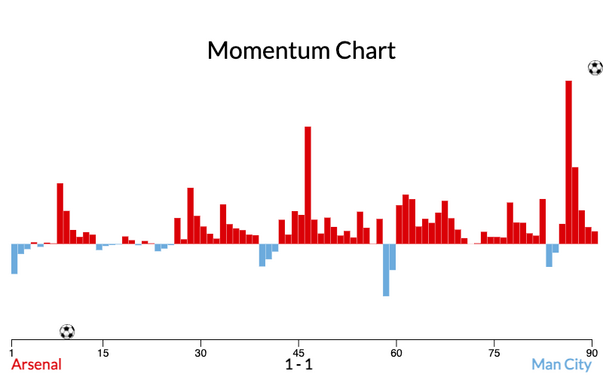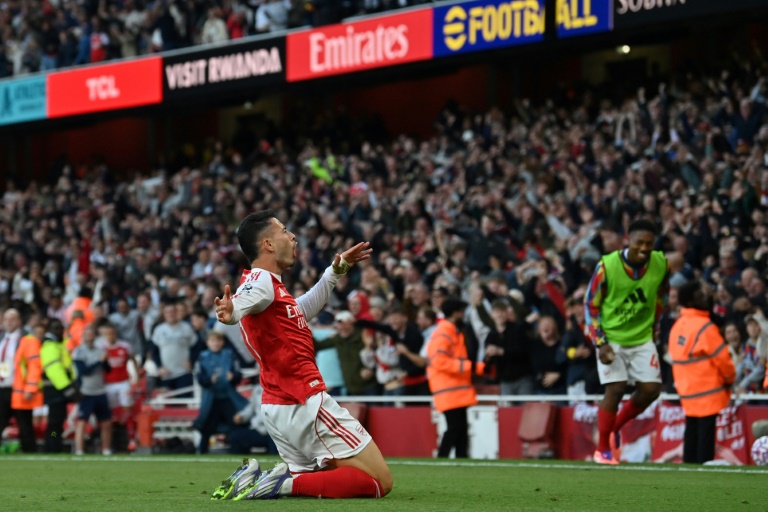In a Premier League fixture that promised fireworks and delivered a curious blend of tactical caution and dramatic flair, Arsenal managed to snatch a vital point against Manchester City. What unfolded at the Emirates was less a free-flowing spectacle and more a chess match, initially dominated by strategic hesitancy, only to erupt into a testament of resilience and the undeniable power of well-timed substitutions.
The First Act: A Stifled Opening
From the outset, the air of anticipation felt heavy, yet the football on the pitch struggled to ignite. Arsenal, under Mikel Arteta, appeared to adopt a cautious approach that, for much of the first half, seemed to shackle their natural attacking verve. The decision to deploy a midfield trio that, while defensively robust, lacked a certain creative spark in the final third, visibly hindered their ability to carve open a notoriously stingy Manchester City defense. Passes often found themselves recycled, momentum evaporated, and genuine threats on goal were scarce. One could almost hear the collective sigh of the Emirates faithful as opportunities went begging or simply failed to materialize.
It was a stark contrast to the Arsenal that fans have come to expect – a team celebrated for its dynamism and relentless forward play. Instead, the Gunners found themselves caught in a tactical quandary, seemingly unwilling to fully commit bodies forward even after City had taken an early lead. The result was a period where Arsenal struggled to register meaningful attempts, allowing their opponents to settle into an uncharacteristically comfortable defensive posture.
Guardiola`s Gambit: The Defensive Giant
Perhaps the most intriguing aspect of the first half was Manchester City`s uncharacteristic display. Under Pep Guardiola, a manager synonymous with relentless attacking football and suffocating possession, City adopted a remarkably pragmatic, almost defensive, stance. It was a strategy born, perhaps, out of fatigue following a demanding midweek European fixture and a deep respect for Arsenal`s potential threat. The Premier League champions, often dictating terms with surgical precision, found themselves ceding possession, retreating into their own half, and forming a disciplined low block.
“Sometimes you have to defend because the opponent is better,” Guardiola himself conceded post-match, a statement that speaks volumes about the perceived threat of Arsenal, even in their subdued state.
The irony was palpable: the team lauded for its offensive prowess was attempting to “suffer ball their way to victory,” absorbing pressure rather than exerting it. This tactical shift, while perhaps prudent given their fixture congestion, inadvertently set the stage for the drama that was to follow.
The Turning Point: Arteta`s “Finishers” Ignite the Spark
As the second half commenced, the narrative shifted dramatically. Mikel Arteta, acknowledging the limitations of his initial setup, rang the changes. The introduction of players like Bukayo Saka and Eberechi Eze immediately injected pace, purpose, and much-needed creativity into Arsenal`s attack. Where the first half had seen hesitant movements, the second was marked by direct runs, incisive passes, and a clear intent to penetrate City`s rearguard.

Eze, in particular, proved to be the creative lynchpin, his body shape and quick distribution consistently pushing Arsenal forward. He brought the guile that had been conspicuously absent, linking play and probing the spaces behind City`s high defensive line. These “finishers,” as Arteta has often called his impactful substitutes, were not just fresh legs; they were tactical masterstrokes that fundamentally altered the game`s momentum.
The Equalizer: Poetic Justice and Tired Mistakes
The sustained pressure, fueled by Arsenal`s renewed attacking intent, began to wear down a visibly fatigued Manchester City. Defending with a high line while lacking sufficient pressure on the ball carrier is a recipe for disaster, and City ultimately succumbed to this very equation. A lapse in concentration, a moment of uncharacteristic slackness from the champions, was all it took. Eze, spotting a gap, delivered a perfectly weighted lofted through ball over the top of City`s defense. Gabriel Martinelli, another “impactor” from the bench, latched onto it with a deft first touch, coolly lifting it over the advancing goalkeeper.
The equalizer was a moment of poetic justice, not just for Arsenal`s second-half resurgence, but for the echoes of a year prior. Almost 364 days ago, it was City who snatched a late point from Arsenal. Now, the tables had turned. “It`s a pity but it`s football, right?” Guardiola mused, acknowledging the symmetry of the situation.
Revenge, or Just a Point Gained?
For Arsenal, this result is a complex tapestry of emotions. On one hand, securing a late equalizer against a formidable rival like Manchester City is a testament to their fighting spirit and the depth of their squad. It`s a psychological boost, a form of “revenge” that prevented City from claiming a dramatic triumph. On the other hand, the initial tactical struggles raise questions about Arteta`s conservative starting choices. Was it two points dropped due to a cautious first-half display, or a vital point gained through resilience and effective in-game management?
Ultimately, the draw showcases Arsenal`s capacity to adapt and overcome adversity, even if some of that adversity was self-imposed. It also highlights the relentless nature of the Premier League title race, where even the most dominant teams are pushed to their limits, sometimes forced to abandon their principles, and where a single moment of brilliance or fatigue can swing the balance. As the season progresses, both managers will undoubtedly scrutinize this encounter for lessons learned, for the fine margins that define championship contenders.

